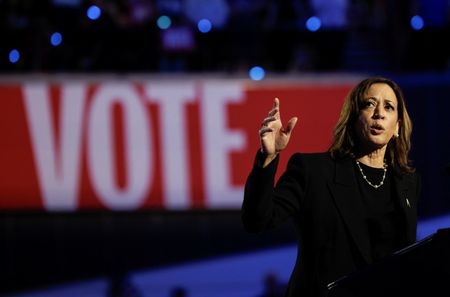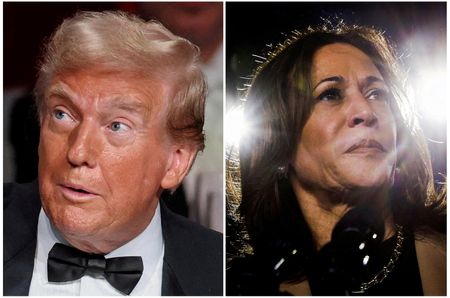By David Morgan and Nathan Layne
WASHINGTON (Reuters) -Donald Trump threw his support behind embattled U.S. House of Representatives Speaker Mike Johnson on Friday, seeking to demonstrate unity as Johnson struggles to quell dissent within his fractious Republican majority.
“He’s doing a really good job under very tough circumstances,” Trump said at a press conference with Johnson at his Mar-a-Lago resort in Florida.
Johnson gained the speaker’s gavel in a weeks-long October nominating battle after a handful of House Republican hardliners orchestrated the ouster of his predecessor, Kevin McCarthy, a historic first.
Another party hardliner, Representative Marjorie Taylor Greene, has threatened to make a similar move against Johnson if he allows a vote on more aid for Ukraine as it struggles to fight off Russia’s invasion. Greene had also voiced opposition to a surveillance bill the House finally passed on Friday.
Trump, the Republican presidential candidate facing a rematch against Democratic President Joe Biden in November, referred to Greene as a friend but expressed clear disapproval of her threat to oust Johnson.
“It’s unfortunate that people bring it up, because right now we have much bigger problems,” Trump said. “I think he’s doing a very good job. He’s doing about as good a job as you’re going to do. I’m sure that Marjorie understands that. She’s a very good friend of mine. And I know she has a lot of respect for the speaker.”
In a post on X after Trump’s press conference with Johnson, Greene said she supported Trump but not Johnson. She made no mention of her threat to force a vote to remove Johnson from leadership.
“I support President Trump and am working as hard as possible to help him win in November and winning a Republican House and Senate majority,” Greene said. “But I do not support Speaker Johnson.”
The appearance with Trump could help buck up Johnson’s standing with his 218-213 majority. His own members have repeatedly torpedoed his legislative priorities, including this week by temporarily blocking the surveillance bill and in February, when it took two efforts to advance a bid to approve articles of impeachment against Biden’s top border official, Homeland Security Secretary Alejandro Mayorkas.
Trump, who holds great sway with congressional Republicans, has also regularly weighed in on legislation, including killing a bipartisan U.S.-Mexico border security deal, passage of which could have weakened one of his key attacks against Biden.
NOVEMBER FOCUS
Trump and Johnson unveiled a proposal linking one of Trump’s key campaign issues – a surge in migrants entering the country illegally via the U.S.-Mexico border – to his longstanding false claim that U.S. elections are marred by widespread fraud.
Johnson pledged to introduce legislation that would require presenting proof of U.S. citizenship before voting. Without providing evidence, Johnson said that large numbers of people entering the country illegally were being encouraged by Democrats to register to vote.
“We’ll be able to ask this very important question of the Democrats … Do you believe that Americans, and Americans alone, should be the ones who vote in American elections?” Johnson said. “We’re about to find out their answer.”
In a statement White House spokesperson Andrew Bates called the proposed bill “redundant” and a “stunt,” noting that it is already illegal for non-citizens to vote in federal elections.
Senate Democratic Leader Chuck Schumer said the press conference at Mar-a-Lago was aimed at sowing “confusion and distrust in our elections.”
Even if the House passes such a bill, it is unlikely to receive a warm reception in the Democratic-majority Senate or be signed into law by Biden.
Andrew Garber of the Brennan Center for Justice, said numerous studies — including one commissioned by Trump during his presidency — had shown voting by non-citizens to be extremely rare.
“On top of the fact that it’s already illegal, there is just no evidence that non-citizens are voting in any numbers,” said Garber, counsel in the left-leaning think tank’s voting rights and election program. “There is no need for any new federal legislation.”
(Reporting by Nathan Layne and David Morgan; Editing by Scott Malone, Jonathan Oatis, Deepa Babington and Leslie Adler)











